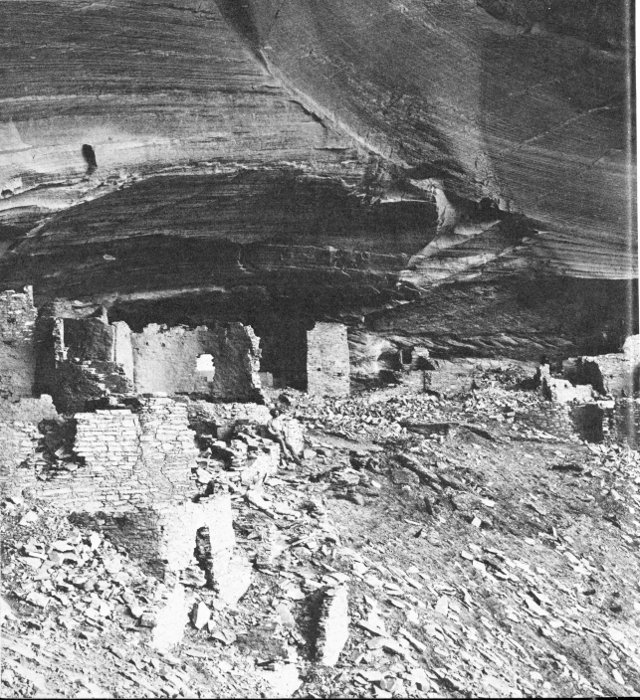
Canyon de Chelly
The Story of its Ruins and People
by Zorro A. Bradley
Office of Publications
National Park Service
U.S. Department of the Interior
Washington, D.C.,
1973
Library of Congress Catalog Card Number 73-600078
Contents
- Discovery of the Ruins 3
- The Principal Ruins 7
- White House 7
- Antelope House 9
- Standing Cow 12
- Big Cave 13
- Mummy Cave 15
- The People of Canyon de Chelly 17
- The Anasazi 18
- The Navajos 27
- Further Reading 57
- Maps 8, 24, 39
Far up above me, a thousand feet or so, set in a great cavern inthe face of the cliff, I saw a little city of stone asleep. It was as stillas sculpture—and something like that. It all hung together,seemed to have a kind of composition: pale little houses of stonenestling close to one another, perched on top of each other, withflat roofs, narrow windows, straight walls, and in the middle ofthe group, a round tower....
In sunlight it was the colour of winter oak leaves. A fringe ofcedars grew along the edge of the cavern, like a garden. Theywere the only living things. Such silence and stillness and repose—immortalrepose. That village sat looking down into thecanyon with the calmness of eternity.... I had come upon thecity of some extinct civilization, hidden away in this inaccessiblemesa for centuries, preserved in the dry air and almost perpetualsunlight like a fly in amber, guarded by the cliffs and the riverand the desert.
—Willa Cather
Quotation from The Professor’s House, 1925, by permission of Alfred A. Knopf, New York.

The righthand sectionof Mummy Cave Ruinas it was photographedby Ben Wittick in1882 during the JamesStevenson Survey forthe SmithsonianInstitution.
Discovery of the Ruins
Canyon de Chelly National Monumentis located in the red rockcountry of northeastern Arizona’shigh plateau, near the center ofthe Navajo Indian Reservation.Included in its 131 square milesare three spectacular canyons—Canyonde Chelly, Canyon delMuerto, and Monument Canyon—andmany ruins of long-desertedvillages. Perched in alcoves andon high ledges along the sheer-walledcanyons, these villages areevidence of man’s ability to adjustto a difficult environment, usingbare ha